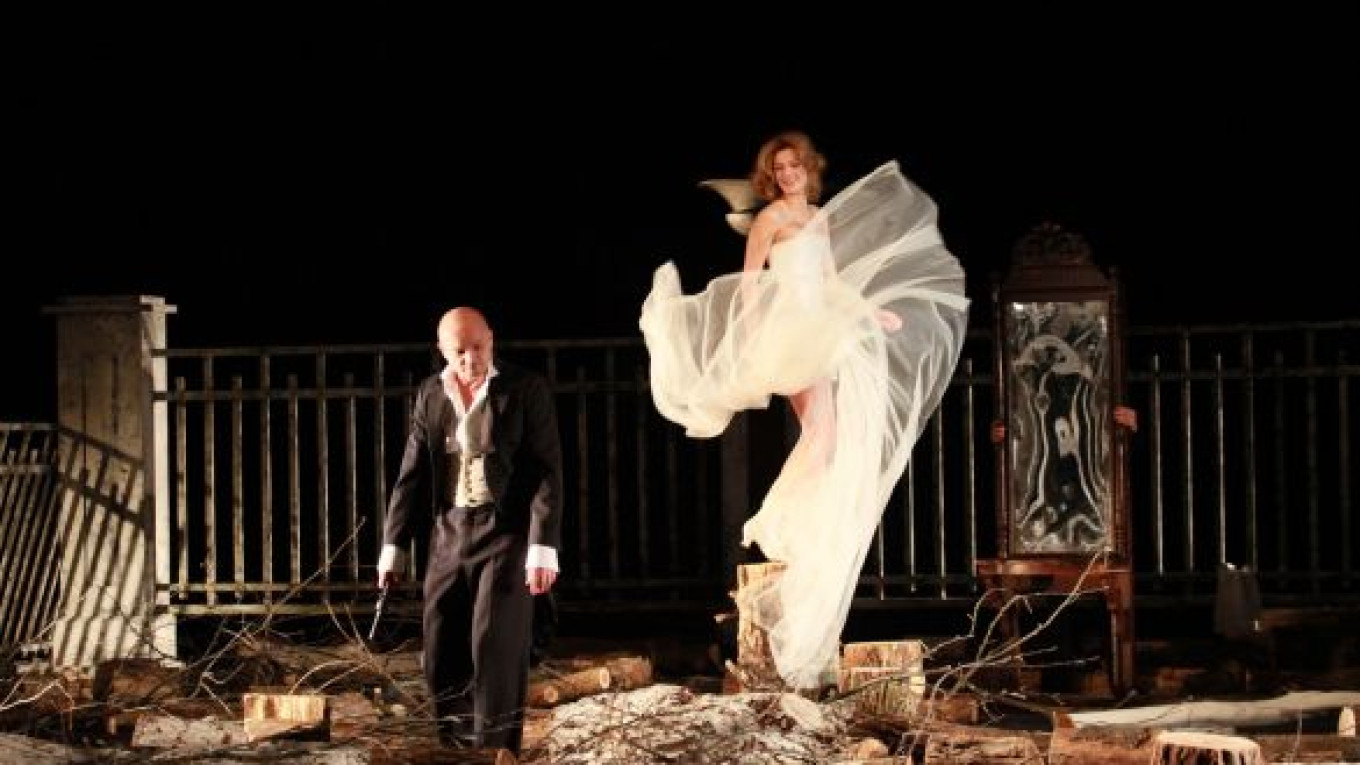Yury Butusov and the Moscow Art Theater were hardly alone this season in putting together a production of a play by Anton Chekhov. In this, the year honoring the 150th anniversary of the writer’s birth, there has been a veritable explosion of productions of Chekhov’s plays and adaptations of his stories.
The Chekhov International Theater Festival is now under way, and by the time it ends on July 30 it will have brought us 25 Chekhov-inspired works from around the world.
One of those productions is Butusov’s interpretation of Chekhov’s early play “Ivanov.”
Especially in his work across town at the Satirikon Theater, Butusov has proven himself to be one of the boldest and most interesting directors to emerge in Moscow in the last decade. For what it’s worth, he actually hails from St. Petersburg, and the stylistic clarity and intellectually challenging manner of his best work is reminiscent of the aura that city projects.
I must admit that I have been less impressed by Butusov’s work at the Art Theater, and that goes for “Ivanov” as well. The acting style at the House that Stanislavsky Built is often reduced to nuances so subtle and supposedly lifelike that it actually becomes difficult to discern from no style at all.
Butusov, on the other hand, wants and requires eccentricity and audacity.
“Ivanov” was surely an audacious play for the young, 27-year-old Chekhov to write. It was all about the failure of love, family and life itself. It ends melodramatically with the title character running off to shoot himself in anger and despair.
Clearly, when writing “Ivanov,” Chekhov had not yet worked his way up to the blistering sarcasm of “Uncle Vanya,” a play he would write a decade later. There he would turn suicide into a clumsy, bitterly comic, failed attempt at murder.
Murder, suicide, failure or incompetence — Chekhov was always exploring territories where people are cut adrift from their dreams. He had a way of making it appear genteel and discreet on the surface, but that surely was another example of his sarcasm at work.
Butusov wastes no time in getting to the heart of the matter. With the curtain still closed and the house in darkness, we hear a gunshot.
So, Ivanov’s fate is sealed before anything begins.
Or is it? Because by the end of this performance we have given up believing that Ivanov is truly suicidal. As events unfold, he increasingly resembles someone who fakes suicide all the time, perhaps in part to try it on for size, perhaps to see what effect it may have on others.
Butusov recalibrates the play by picking up on a few of Chekhov’s specific words — the notion of Ivanov’s youth “awakening” in him seconds before he goes to shoot himself, and his claim that he has been racing “downhill on an incline” for too long.
Butusov interprets both instances literally.
In the first case, he has Ivanov (Andrei Smolyakov) seemingly commit suicide repeatedly, only for us to see him invariably wake up again as if from a slumber. In the second, Butusov avoids that final suicide altogether by giving Ivanov the task of piling broken branches on an enormous wood pile. Both he and the branches often slip back down the incline, bringing to mind the picture of Sisyphus eternally rolling his rock up a hill before it rolls back down.
Ivanov’s tragedy is his loss of a feeling for, and of, life.
His wife Sarah (Natalya Rogozhkina) means nothing to him anymore. His lover Sasha (Natasha Shvets) is beautiful, but he sees her only as a China doll. His old friend Lebedev (Igor Zolotovitsky) would talk sense into him if possible, but nothing makes sense to him anymore. His jaded old uncle Shabelsky (Sergei Sosnovsky) may be close to him in spirit but is worlds apart in sensibility.
Everyone is alien to Ivanov, no matter what their character or their place is in his life. The bigger the crowd around him, the more this man is alone.
Designer Alexander Borovsky set the action in a devastated, hacked-up former orchard. Could this be what was left of the cherry orchard in the last play Chekhov ever wrote?
Ultimately Butusov’s take on “Ivanov” works better in theory than in practice.
In its best moments, it is chaotic, strange and unexpected. More often, however, the performance suffers from the same aimlessness and enervation that keeps trying to kill Ivanov off, but can’t.
“Ivanov” plays June 8 at 7 p.m. at the Chekhov Moscow Art Theater, located at 3 Kamergersky Pereulok. Metro Okhotny Ryad. 692-6748, www.mxat.ru. Running time: 2 hours, 25 minutes.
A Message from The Moscow Times:
Dear readers,
We are facing unprecedented challenges. Russia's Prosecutor General's Office has designated The Moscow Times as an "undesirable" organization, criminalizing our work and putting our staff at risk of prosecution. This follows our earlier unjust labeling as a "foreign agent."
These actions are direct attempts to silence independent journalism in Russia. The authorities claim our work "discredits the decisions of the Russian leadership." We see things differently: we strive to provide accurate, unbiased reporting on Russia.
We, the journalists of The Moscow Times, refuse to be silenced. But to continue our work, we need your help.
Your support, no matter how small, makes a world of difference. If you can, please support us monthly starting from just $2. It's quick to set up, and every contribution makes a significant impact.
By supporting The Moscow Times, you're defending open, independent journalism in the face of repression. Thank you for standing with us.
Remind me later.


